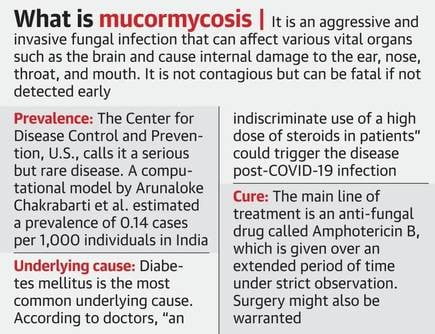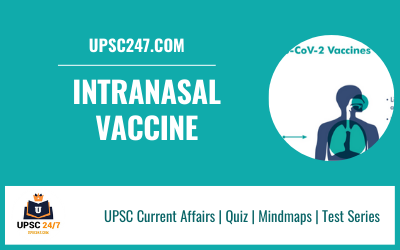Black Fungus UPSC | What is Mucormycosis | Symptoms | Causes | Treatment – The Union government has asked the States to declare mucormycosis, the fungal infection being reported in COVID-19 patients, an epidemic. In a letter to the States, Health and Family Welfare Ministry said declaring the black fungus infection seen in COVID-19 patients an epidemic would lead to health facilities screening for it and reporting all such cases to the government.
About Mucormycosis:
- Mucormycosis is a rare but serious infection that is caused by a group of moulds called mucormycetes. Colloquially termed ‘Black Fungus’, it was previously known as
- Mucormycosis largely affects people who have health problems or use medicines that depress the body’s ability to combat germs and illness.
- It reduces the ability to fight environmental pathogens.
- It most commonly afflicts the sinuses or the lungs after inhaling fungal spores from the air.
- It can also happen on the skin after a burn, cut or other type of skin wound through which the fungus enters the skin.
- It can also affect the brain.
- People having co-morbities, variconazole therapy, uncontrolled diabetes mellitus, immunosuppression by steroids or prolonged ICU stay can get predisposed to the fungal infection.
- Warning signs include headache, fever, coughing, blood vomits, breathlessness and altered mental status.
- It mainly affects people who have health problems or take medicines that lower the body’s ability to fight germs and sickness.

Types of Mucormycosis:
| Type | Details |
| Rhinocerebral (Sinus and Brain) Mucormycosis |
|
| Pulmonary (Lung) Mucormycosis |
|
| Gastrointestinal Mucormycosis |
|
| Cutaneous (Skin) Mucormycosis |
|
| Disseminated Mucormycosis |
|
Transmission Or Spread Of Black Fungus
- People can spread black fungus on coming in contact with the spores from the environment.
- In case of the lung or sinus infection the person can be infected after inhaling the spores from the air.
- A skin infection can occur after the fungus enters the skin through a scrape, burn, or other type of skin injury.
- They are more common in soil than in air, and in summer and fall than in winter or spring.
- These fungi are not harmful to most people but for people who have weakened immune systems, breathing in micromycetes spores can cause an infection
- Mucormycosis does not spread between people or between people and animals.
See Also – Cybercrime Volunteer | UPSC | All You Need To Know About I4C
Symptoms Of Black Fungus Or Mucormycosis
- Pain and redness around eyes and/or nose
- Fever
- Headache
- Coughing
- Shortness of breath
- Bloody vomits
- Altered mental status.
Prevention From Black Fungus
- Cleaning and replacement of humidifiers (for those using Oxygen Concentrators)Sterile normal saline should be used in the humidifier Bottle.
- Changed daily Masks should be disinfected/washed daily.
- Those who are taking steroids should also keep checking their blood sugar levels.








